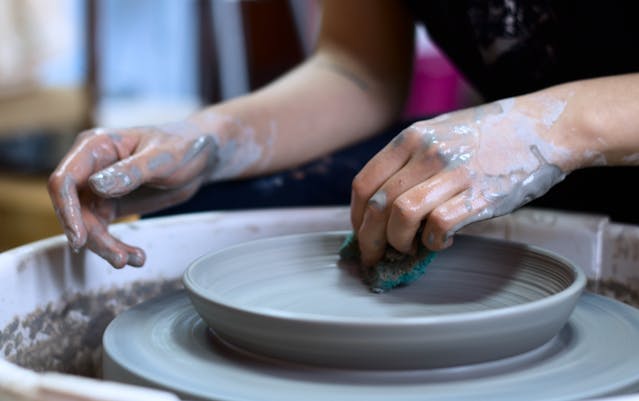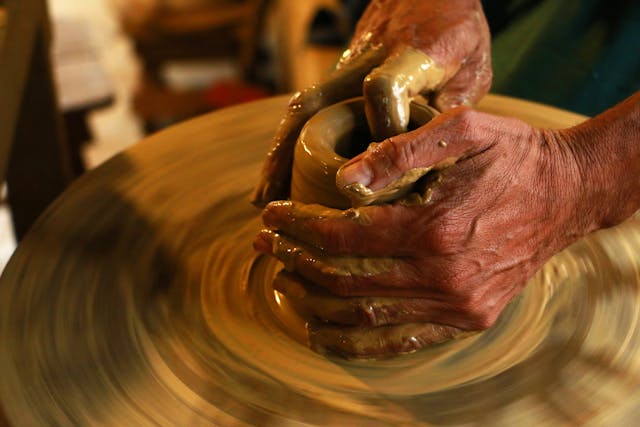Handmade products are not a little enterprise.
The creative manufacturing and handmade (CMH) industry is predicted to generate $1 trillion in sales by the end of 2024. Even if the future seems bright, the industry currently faces a number of difficulties, including product development, social media marketing, and market and financing accessibility.
Growing your company and getting your items in front of prospective buyers may be difficult for an artisan. As a small firm, you have to contend with high initial expenses, narrower profit margins, competition from mass-market goods and other craftsmen, and sluggish growth.
If you want to pursue your passion in the craft sector, you may use Amazon Handmade, a marketplace specifically designed for artists wishing to sell their handmade goods, to exhibit your distinctive handcrafted items. Amazon Handmade has a vast audience and big platform.
We’ll go into great detail about Amazon Handmade items in this post, including what it is, how it functions, and how to begin selling on it.

Table of Contents
What Is Handmade items on Amazon?
Amazon Handmade is a network exclusively for makers and craftsmen that was founded in 2015. It is made up of craftspeople who produce and market their handcrafted goods from more than 80 different nations. Please be aware that there are presently just two locations where Handmade shops can be found: North America and Europe. In contrast to other Amazon businesses, handcrafted goods that aren’t mass-produced must be listed on Amazon handcrafted by makers and craftsmen.
What does Amazon consider to be handmade?
Handcrafted items must be manufactured in accordance with Amazon Handmade’s requirements in order to be sold there. Handmade items have to be created completely by hand. (This includes parts that are hand-assembled or changed.) Automated technology cannot be used to mass-produce or create handmade goods, not even assembly lines. Hand tools and some machines may be used by craft vendors. It is advised that you take a closer look at the platform’s requirements to ensure compliance if these things are a part of your maker process.
Why Sell Handmade items on Amazon?
Selling your handcrafted goods on Amazon Handmade has a number of advantages. Among them are:
- Access to the enormous worldwide client base of Amazon
- Using the fulfillment services offered by Amazon
- Enhanced recognition and trustworthiness for your company
- Availability of Amazon’s suite of marketing and sales tools
- Universal Product Codes (UPC) are not required in order to begin selling
- Your handcrafted goods will continue to show up in Amazon search results.
Furthermore, it’s possible to make money selling handmade goods on Amazon Handmade. Sellers of handmade goods may make anything between $1,000 and $100,000 a month. On the other hand, 45% of Amazon Handmade merchants report average monthly sales that fall between $1,000 and $25,000.
It is important to remember that selling on Amazon Handmade has some disadvantages. You may only sell handmade, hand-altered, or handcrafted customized things, and you’ll need to abide by Amazon Handmade’s rigorous criteria.

How to List Handmade Items on Amazon
Although being an Amazon Handmade vendor just requires a simple registration step, there is a rigorous screening process involved. When submitting an application, Amazon will need the following details from you:
- Name and email address of you
- Information about your manufacturing procedures and design
- pictures of your work that also need to include your company name, logo, or business card
In addition to these prerequisites, you’ll need to determine what sort of Maker you are. You may choose from the following four categories on Amazon Handmade:
Maker working alone: You are the one who conceptualizes and produces the goods.
Maker with less than twenty workers: You collaborate with a small team while still designing and producing the goods yourself.
Collaborative groupings of Makers: them may be cooperatives, nonprofits, or charities. Amazon will still take them into account depending on how these organizations can help local Makers.
Other: For Makers who don’t fit into any of the above mentioned categories
After that, you’ll have to provide additional information about your work, such as which choice best describes it and the specifics of your manufacturing process, including the materials, methods, and equipment you use or the amount of time it takes to create a single product. Amazon gives you three definitions for the options:
Handcrafted goods are those that are created solely by hand.
Hand-altered: You modify already-made items, such as clothing, for which you create a new design.
handcrafted customized: You may add specifics to handcrafted goods at the request of your customers.
Additionally, you must provide in-depth pictures of your handcrafted goods. Including other details about your company, including if you have an active online shop or a presence across many social media networks, is also beneficial.
Finally, you will be prompted by Amazon Handmade to choose the product category in which you want to sell. You will have to wait one to two weeks for your application to be approved after submitting it. You may begin offering your handcrafted goods on Amazon handcrafted as soon as your application is accepted.
How Do Products Get Sold on Amazon Handmade?
Goods sold on Amazon Handmade are subject to fulfillment of Amazon Handmade’s product eligibility standards. It follows that you have to be the one to develop and produce your own goods. As an alternative, you may collaborate with a small group of relatives or coworkers—ideally fewer than 20. You are permitted to use light machines and hand tools. Recall that you are not allowed to use automated technologies or assembly lines for mass production.
You may list pre-made and hand-altered goods on Amazon Handmade as well. You may even list used or upcycled things as long as you’ve made improvements to increase their worth. You may also sell reused goods on Amazon Handmade or utilize an item’s individual parts to make a whole new product.
Identifying Handmade Goods to Sell on Amazon
The choice of what to offer in an artisan’s Amazon Handmade shop is another obstacle. It helps to know your specialization well before registering with Amazon Handmade. Which goods are your areas of expertise? Which category are your items going to fit into?
Examine what your rivals are doing. What goods do they offer for sale? In what way do they advertise their goods? What is their brand presentation? Finally, make sure you test each product before listing it on Amazon Handmade. For every product, you may make a small batch and get client comments and reviews. By doing this, you may better understand your clients’ viewpoints and make improvements to your goods.
How to Become a Handmade Seller on Amazon
Amazon Handmade is designed for makers who want to market their handmade goods. You must fulfill the requirements set out by Amazon in order to become an Amazon Handmade seller, especially with regard to the goods you are selling. The sections below detail each category along with its unique listing regulations and criteria. For example, if you want to sell handmade artwork, it must adhere to Amazon Handmade’s requirements for handmade artwork, which include the following:
You have to create unique art. This implies that you have to be the one to construct or design them.
All of your handmade artwork has to abide by Amazon’s standard guidelines and rules.
You must adhere to Amazon’s category, product, and listing guidelines when selling handmade artwork.
In addition to these rules, there are a number of Amazon selling and listing regulations that you must follow. In addition, you should be aware of the following limitations with Amazon Handmade:
Sellers of handcrafted goods on Amazon are not permitted to dropship or outsource their product manufacturing.
Products created by other parties are not permitted for resale.
It is not permitted for you to sell any of the following things in your Amazon Handmade store: software, downloaded files, food or other consumables, live plants, and electronics.

Although there are few exceptions, such as crafting supplies that come in DIY kits, supplies you make yourself, and supplies you modify yourself, raw materials and crafting supplies are also often forbidden.
How to Register with Handmade by Amazon
Getting started as an Amazon Handmade merchant is not too difficult. You must first finish your registration and establish an Amazon Seller Central account. Once your selling account has been authorized, you must apply to join the Amazon Handmade Artisan program. After that, you can begin selling your items in your Handmade store and using Amazon’s many tools and initiatives to expand your company.
What Is It Possible to Sell on Amazon Handmade?
Handmade is available to craftsmen who create handmade items in the following categories, according to Amazon:
- Add-ons
- Art.
- Sweetheart
- Beauty and Self-Treatment
- Outfits
- Handbags and Shoes
- Presents
- House
- Home and Outdoor Maintenance
- Watches and Jewels
- Dining Room and Kitchen
- Supplies for Pets
- Athletic Supplies
- Party supplies and stationery
- Games and Toys
No goods may be offered in the Handmade shop if they do not fit into one of these categories. Consider opening accounts with additional Amazon shops if you’re thinking about selling goods that don’t fit into any of the aforementioned categories.
Just a brief reminder for current Amazon sellers: as long as you have completed the Amazon Handmade application and have been given the go-ahead to sell, you may continue to offer your handmade goods in the Handmade shop even if you are already selling on Amazon. Amazon permits you to go on selling your other non-handmade goods in other Amazon shops in the meantime.
How Much Does Selling Handmade Products on Amazon Cost?
It costs nothing to open a handmade business and list your goods. Additionally, there are no hidden costs and no monthly listing fee with Amazon Handmade. However, Amazon Handmade levies a referral fee, which may take the form of a minimum fee per item, a 15% deduction each transaction, or a flat percentage rate. The applicable minimum referral fee for Amazon Handmade is $1.00 per item and is applicable to the majority of the above-mentioned categories.
Only Amazon Handmade sellers who have enrolled in a Professional selling plan are eligible for these referral payments. You will be charged the regular referral fees in place of Handmade vendors who haven’t yet upgraded to such plan.
Be aware that Amazon will want you to sign up for a Professional Selling plan throughout the registration process. This plan has a monthly fee of $39.99. Nevertheless, beyond the first month, the aforementioned charge will be removed if you are accepted as an Amazon Handmade vendor. Moreover, additional costs will apply if you choose to enroll in Fulfillment by Amazon (FBA).
Which is Better for Selling on Etsy or Amazon?
Etsy is another well-liked platform for manufacturers and artists to offer one-of-a-kind handcrafted goods. Which market is best for you as an artisan? Your final decision will be influenced by a number of variables, including your specialty, target market, and company objectives.
For artists that want to reach a large consumer base, Amazon Handmade could be a better option. You may wish to use Etsy if buyers who are seeking for more specialized items are part of your target market.
In addition, artists hoping to make the most money possible might benefit from using Amazon’s artisan-only marketplace. You can consider creating an Etsy account if you’re in the process of developing your brand or if you have a stronger affinity for crafts.
There are several notable distinctions between the two markets’ fees. With Amazon Handmade, you may list an infinite number of goods for free—even without UPCs—and there is no monthly membership cost. In addition, Amazon Handmade takes 15% of each transaction as a referral fee.
Meanwhile, there are a number of expenses you’ll encounter if you want to sell on Etsy, including listing, transaction, and payment processing fees.
The Greatest Ways to Sell Handmade Items on Amazon
What is the greatest way to grow your Handmade Amazon business? We’ll be providing some useful advice for selling on Amazon Handmade below:
Why You Should Not Start A Business
See the Handmade Hub
Amazon Handmade offers resources for craftspeople to assist in starting and expanding their businesses. All of them are available via the Handmade Hub.
Ensure that people can see your handcrafted listings.
Occasionally, you can discover that your Handmade listings are hidden from view. There are a number of listing- and account-related causes for this. You may not be able to view your listings, for example, if your goods are out of stock or if your Inventory Upload has mistakes.
A degraded selling account or having an account that isn’t part of the Professional selling plan are examples of account-related causes. There can also be tax information that is lacking. utilizing generic search phrases to find your listings and utilizing generic titles, descriptions, or keywords for your items are two more reasons why you can’t discover your listings.

Make your search phrases more efficient.
Selecting the appropriate keywords may increase the visibility of your items and facilitate easier product discovery for your intended market. Finding relevant keywords to include in your product descriptions is helpful. Make sure the search phrases you choose are relevant to your goods. Testing also enables you to find search phrases that raise your search ranking. Finally, confirm that the search words you have entered are not misspelled and do not include phrases or sentences.
Make use of sharp pictures
Using crisp, high-resolution photos that highlight your product’s features is advised by Amazon. This gives prospective buyers a greater opportunity to see and evaluate your offerings. Additionally, it helps you leave a positive impression on them. For all of your photographs, a white backdrop works best. Moreover, avoid tagging your primary photographs with trademarks or watermarks.
Make your product descriptions more effective.
Product descriptions not only assist prospective buyers learn more about your offerings, but they may also raise your search engine results. It is important to have distinct product descriptions while writing them. Give your items a background to add a personal touch.
Additionally, make an effort to develop succinct product descriptions without sacrificing important details like the advantages of your offering. To make your product descriptions simple to read and well-organized, use bullet points. Make careful to emphasize the salient characteristics and advantages of your product while using bullet points. Including age limitations or cautions is another way you may assist your clients.
A product’s manufacturing process may take some time at times. When this occurs, you may assist in establishing the expectations of your prospective clients by providing an expected production time for each listing. As per Amazon, you might possibly increase the number of glancing views for your listings by 20% if you can provide a delivery schedule of fewer than 14 days.
Use the Sponsored Products function on Amazon.
Selling on Amazon will inevitably expose you to fierce competition from other vendors on the marketplace. Use Amazon’s Sponsored goods feature—CPC advertising that show up in relevant shopping results and product pages—to make sure your goods stay exposed to your target audience and get a competitive advantage.
Consider registering with Amazon FBA.
For vendors, fulfilling orders may be a laborious task. Consider enrolling in Amazon’s FBA program, which enables merchants to contract out order fulfillment, if you’re experiencing problems with order fulfillment. Benefits like free delivery, access to Amazon Prime FREE Two-Day delivery, and use of Amazon’s customer support network are yours when you join up for Amazon FBA. Generally speaking, it would be ideal if you could provide more precise delivery schedules as this enhances client satisfaction and builds your brand’s credibility. To draw in clients, you could also want to consider providing free delivery choices. Keep in mind that “total delivery time” as defined by Amazon includes both the transportation time and your production or handling time.
Expanding your company with Amazon Handmade
You may reach Amazon’s enormous client base by selling on Amazon Handmade. When carried out correctly and after according to Amazon Handmade’s rules and regulations, it may also prove to be a highly lucrative endeavor. You’ll want a system that enables you to scale and manage your online company more effectively as your Amazon Handmade business expands.
How To Develop Robust Supplier Connections For Your Company
With the marketplace management platform Threecolts, you may get personalized company solutions. You may locate a Threecolts platform that can help you maximize your Amazon Handmade company, from profit recovery to conversion optimization. Read more










